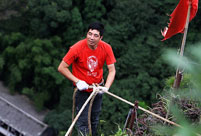 |
| Yang Yongqing and the crew of the train which took her and her comrades to the region where they had spent an influential part of their lives Photo: Courtesy of Yang Yongqing |
The volunteer
Yang Yongqing was one of the key organizers of the September trip and one of the earliest zhiqing from Shanghai to go to work in Xinjiang. In 1963, she rejected an offer to go to Hong Kong where her family members lived in, quit her job as a sales assistant in a radio shop, and volunteered to go to Xinjiang. She arrived in Shihezi in northern Xinjiang and began working on farms and teaching.
When the then premier Zhou Enlai visited Shihezi in July 1965 Yang was his escort. When Zhou learned that she had come from a well-off family and travelled thousands of miles to help the nation's outskirts, he remarked that it would have not been easy for her.
"Once when some Shanghai zhiqing planned to leave and found out I wanted to stay they were unhappy and said I was just trying to look good. But I wasn't. I thought that since we had come to help construct the country's far-flung areas, we should stay and do that. And after Premier Zhou had encouraged me, I had more reasons to stay," the 74-year-old said.
During the Cultural Revolution, the scarcity of oil was a big problem where Yang worked and lived, and each household was allocated just 3 liters of oil a month. But in the late 1970s, Yang helped promote sunflower oil across northern Xinjiang and was gratified to be told some time later that there was more oil than needed.
In 1981, Yang began to work at the Science Association in Urumqi. She had always had an interest in science and technology, and realized the importance of encouraging this interest in school children. She organized lectures, competitions and exhibitions at schools all over Xinjiang.
"The project's yearly allowance was a mere 50,000 yuan and it was way more difficult to do this work in Xinjiang than in Shanghai - the many different ethnic groups meant different translators had to be involved constantly," she recalled.
On a work trip to a county in 1996, she was in a car accident and suffered a neck injury which led to her retirement from work in the region. In 1998, she returned to Shanghai, where her daughter and son had been living since 1988 (a 1986 regulation gave the children of zhiqing the right to hukou, or household registration, in their parents' hometown).
Retired life
Both Yang and Jiang are getting pensions from Xinjiang although these are considerably less that they would have received from working in Shanghai. But Jiang considers himself "very lucky." He said that when he did return to the city, the Xinmin Evening News helped his daughter find a job at a Traditional Chinese Medicine hospital in Minhang district, and the city government allocated him a two-bedroom apartment in Baoshan district and gave his second wife a Shanghai hukou. "Shanghai has not forgotten me. It feels good to be back," he said.
Yang, who now lives with her daughter in a three-bedroom apartment, said she had been very contented. "I always tell my daughter how we used to live in dingy places that leaked whenever it rained. I never dreamt I would come back to Shanghai. Now I have an apartment, medical insurance, and a pension, and she has a stable job. This is enough."
But for some zhiqing there has been no pleasant resettlement in Shanghai. Zhang Weiming is the leader of a group of zhiqing who have been campaigning for compensation since 2004. Every Wednesday they demonstrate in People's Square demanding that the municipal government increases their medical benefits and pensions to match Shanghai allowances and pay compensation of 10,000 yuan for each year spent at Xinjiang.
Because a number of the zhiqing began to work there before the age of 16, the group also asks for compensation for those who started working in the region before they were aged 16.
The campaign has not been met with a response from the authorities to date - insiders say the demands are regarded as too high.
The 50th anniversary of Shanghai-Xinjiang zhiqing will be celebrated with a conference and gala event at the Shanghai Indoor Stadium on October 22. So far 8,500 people, including many of the zhiqing, have registered.

 2013 Colour Me Rad 5K run held in Canada
2013 Colour Me Rad 5K run held in Canada China's destroyer Qingdao sails out of Sydney Harbor
China's destroyer Qingdao sails out of Sydney Harbor Chinese tycoon aims to restore London's Crystal Palace
Chinese tycoon aims to restore London's Crystal Palace Worst flooding hits Yuyao, 70% of downtown area underwater
Worst flooding hits Yuyao, 70% of downtown area underwater Game for the brave: 'Spiders' in Yandang Mountains
Game for the brave: 'Spiders' in Yandang Mountains Hungarian wingsuit flyer confirmed dead in Zhangjiajie
Hungarian wingsuit flyer confirmed dead in Zhangjiajie New couples take wedding photos during holiday
New couples take wedding photos during holiday Serena Williams stumbles through to quarterfinals
Serena Williams stumbles through to quarterfinals Thailand Mobile Expo 2013 kicks off
Thailand Mobile Expo 2013 kicks off Photo collection of Chinese Navy
Photo collection of Chinese Navy Photo story: Young tenants in Beijing
Photo story: Young tenants in Beijing Twins Culture Festival kicks off in Beijing
Twins Culture Festival kicks off in Beijing UNESCO world heritage site: Montale Tower
UNESCO world heritage site: Montale Tower Israeli drone crashes into Mediterranean, fragments recovered
Israeli drone crashes into Mediterranean, fragments recovered Serena Williams wins second China Open title
Serena Williams wins second China Open titleDay|Week|Month